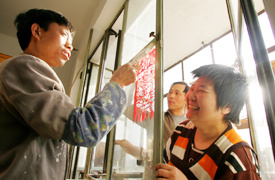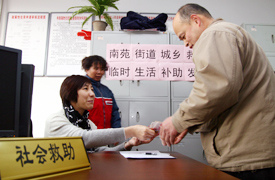|
 |
 |
|
HELP IN NEED: Workers repair the apartment of a poor family in Maizidian Neighborhood in Beijing's Chaoyang District. The cost is covered by the neighborhood (LI SHILEI) |
GOVERNMENT RELIEF: A resident in Beijing's Fengtai District receives living allowance from the government on November 25, 2010 (LI WEN) |
The poverty line that CASS used to measure urban poverty was an average annual per-capita income of 7,500-8,500 yuan ($1,176-1,332).
Wei Houkai, a research fellow with CASS and the lead author of the blue book on China's cities, said that at present there is no uniform standard to determine urban poverty. Economists usually define absolute poverty in terms of the cost of a specified basket of food and non-food items that are considered "necessary" to meet people's basic needs, whereas relative poverty is determined in reference to the per-capita expenditure or income of a region.
"Fifty million was obviously an underestimate of the total number of urban poor in China," said Chen Huai, Director of the Urban and Rural Development and Economic Research Institute of the Ministry of Housing and Urban-Rural Development.
"In the past, under the planned economy, people's incomes were close to the per-capita level, whereas in the market economy the income gap has widened, leaving more people well below the per-capita figure, and resulting in more relative poverty," Chen said.
Ding Sibao, a researcher with the Shenzhen-based China Development Institute, said that urban poverty is a more difficult challenge to solve than rural poverty as the urban poor do not have land to farm and feed their families. Unlike the rural poor, few impoverished urban residents migrate to other cities.
According to researchers, urban poverty did not become a major concern in China until the 1990s when China transformed from a planned economy to a market one.
Under the planned economy, when the government assigned jobs to urban residents, the urban poor were mainly orphans, the elderly and the disabled who had no ability to work, no savings or other income source and no relatives to depend on.
However, amid accelerated economic restructuring since the mid-1990s, many poorly performing state and collectively owned enterprises cut production or closed down. As a result, millions of workers have been laid off and their incomes sharply dropped.
According to a study by Zhu Qingfang, a researcher with CASS, there were 8.77 million laid-off workers who were not counted as unemployed in Chinese cities in 1998, while 5.71 million people were registered as unemployed and 0.6 million retirees' pensions were in default. Assuming these 15 million people each supported one dependent, Zhu estimated that there were 30 million urban poor people at that time. There were also about 1 million urban orphans, elderly and disabled on the welfare roll of the government.
Song said that today the urban poor mainly consist of three groups of people—laid-off workers, migrant workers and fresh college graduates with low-paid or no jobs.
| 